Showman
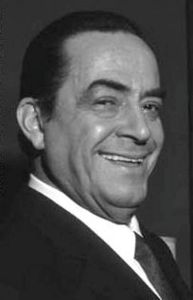 On 26 June 1911 the actor Carlo Dapporto was born in Sanremo from Giuseppe, a shoemaker by profession, and Olimpia Cavallito, a housewife originally from Asti, who gave him his accent from the typical Piedmontese inflection.
On 26 June 1911 the actor Carlo Dapporto was born in Sanremo from Giuseppe, a shoemaker by profession, and Olimpia Cavallito, a housewife originally from Asti, who gave him his accent from the typical Piedmontese inflection.
From the age of fifteen he started working, first as a delivery man in a grocery store, then as a blacksmith, upholsterer, helper in a pharmacy, bartender in a café, lift attendant at the Daetwyller Tea Room, and finally, in 1928, as a waiter at the Moulin Rouge in Alassio.
It was in the small town on the Riviera delle Palme that he began his career as a comedian and entertainer, amusing the public with ironic jokes and hilarious gags through the characterization of his most famous character, the “Maliardo”, with whom he would later always be identified.
Returning to Sanremo in 1934, he made his debut at the famous Caffè Venezuela with his first jokes, enjoying considerable success. He realized, however, that his hometown would not allow him to emerge on a national level, so he decided to move to Milan, where he began to perform in numerous venues.
In the summer of 1935 he met the well-known star of the variety show Vivienne D'Arys, who noticed him at the Savioli Theatre in Riccione while imitating Stan Laurel and hired him in his avant-garde company, where famous comic actors such as Carlo Campanini and Eugenio Testa already performed.
On 10 October 1935 he made his debut at the Teatro Storchi in Modena, performing in a successful imitation of Stan Laurel and Ollio with Carlo Campanini.
In the following years he continued to act in the D'Arys company, perfecting his technique thanks to the example of great professional actors such as Campanini and Testa.
After a brief period spent as a dancer in Anna Fougez's company, where he acted as a sidekick for the comedian Dante Maggio together with René Thano in Ravel's Bolero, in 1940 he put on his first magazine show together with Umberto Franzi, which represented the real turning point in his life as an actor.
In 1941 came the opportunity he had been waiting for: during a show at the Supercinema in Milan, he was noticed by the famous soubrette Wanda Osiris, who hired him as a comedian for her new play, allowing him to make the leap from the world of the avant-garde to that of the Revue.
His debut in the world of theatre took place with the magazine by Nelli and Mangini "Sogniamo insieme", staged at the Alfieri Theatre in Turin with music by Giuseppe Anepeta and the participation of the Trio Lescano. In the 1942-43 season it was instead the time of the debut at the Teatro Quattro Fontane in Rome in the guise of "Maliardo" with the revue Sognate con me", always paired with Osiris.
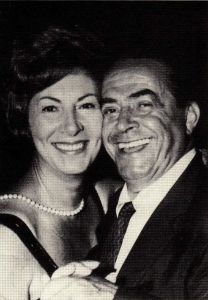 In these years he also met Augusta, a dancer of the show, who he later married and with whom he had children Massimo in 1945 and Dario in 1952.
In these years he also met Augusta, a dancer of the show, who he later married and with whom he had children Massimo in 1945 and Dario in 1952.
After the success of the revue "Che succede a Copa Cabana" (staged in the 1943-44 season with choreographies by Dino Solari), in October 1944 he made his debut with Marisa Maresca in the revue "Ohilalà" by Marcello Marchesi, presented at the Mediolanum in Milan, while the following year he returned to work with Osiris on the "Isola delle Sirene" by Bracchi and Bracci-Dansi. In 1945 he also began his film career by participating in the film "La signora è servita" in couple with Antonio Gandusio, directed by Giannini.
From 1945 onwards, the successes followed one after the other until the establishment of the Carlo Dapporto company, which followed him throughout his artistic career, together with a series of other companies gradually established with the greatest vedettes of the time, including the Dapporto-Masiero Company, the one with Marisa Del Frate, the Dapporto-Fabrizi Company and the Dapporto-Pavone Company.
Of particular note is the show "Riviera follies", financed by the Casino of Sanremo in the 1946-47 season for the relaunch of the city in the immediate post-war period. Other magazines include "Chicchiricchì" by Gelich-Bracchi and D'Anzi, staged in the 1947-48 season, and the great success of "Giove in doppiopetto" by Garinei and Giovannini, with Delia Scala, performed in the 1954-55 season, which marked the birth of musical comedy and was later also proposed in a film version in the homonymous film, the first shot in Italy in Cinemascope.
Together with Lauretta Masiero, the musical comedy by Garinei and Giovannini "Carlo non farlo", set in his Sanremo, was launched in the 1956-57 season. In the following season he returned to perform with Delia Scala in the musical comedy "L’adorabile Giulio", also by Garinei and Giovannini, with music by Gorni Kramer.
On 21st September 1965 he presented the amusing musical comedy by Scarnicci and Tarabusi "L’onorevole", paired with Miranda Martino in the role of a 1920's chanteuse.
In 1966-67 he staged, together with Aldo Fabrizi and Grazia Maria Spina, the magazine "Yo, Yo, Je Je" by Dino Verde and Bruno Broccoli, while in 1969 he celebrated his silver wedding with the theatre, performing with Marisa del Frate the show Hellzap happening by Castaldo, Faele and Torti directed by Edmo Fenoglio.
After a period of inactivity due to health problems, he returned to the stage to take part in a series of brilliant comedies that marked Italian comedy theatre in the 1970s, among which we can mention "Mi è cascata una ragazza nel piatto", by the Englishman Terence Frisby, directed by William Franklin (1969-70); "Il visone viaggiatore", by Ray Cooney and John Chapman; "Un babà per sette", comedy by Faele and Castaldo (1972-73); "Pignasecca e Pignaverde" by E. Valentinetti (1973-74); "Articolo V", comedy by Ugo Palmerini (1974-75) and "Risate in salotto", one of the last great magazines produced with Rita Pavone directed by Alfredo Polacci (1976-77).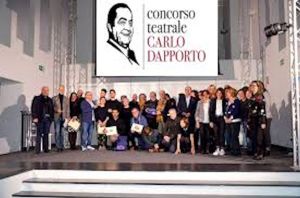 In the early 1970s, Gilberto Govi's dialectal repertoire was also successfully resumed, directed by Vito Elio Petrucci. Altogether there were thirty-eight revue and musical comedies, not counting the prose shows, in which he acted in his theatrical career, alternating with numerous charity shows in orphanages, prisons, sanatoriums, factories, military hospitals, for the Red Cross and the Armed Forces.
In the early 1970s, Gilberto Govi's dialectal repertoire was also successfully resumed, directed by Vito Elio Petrucci. Altogether there were thirty-eight revue and musical comedies, not counting the prose shows, in which he acted in his theatrical career, alternating with numerous charity shows in orphanages, prisons, sanatoriums, factories, military hospitals, for the Red Cross and the Armed Forces.
His success on the public stage took place immediately after the war, thanks to sparkling performances alongside the soubrette Wanda Osiris. These were the golden years of variety, and Carlo, thanks to his versatility, moving from singing to jokes, managed to become the soul of the show. It was in 1947 that as head comedian he set up his own company, staging numerous magazines. In the fifties he was the brilliant protagonist of some musical comedies signed by Garinei and Giovannini: above all Jupiter in double-breasted (1954), together with Delia Scala.
His characters amaze the audience with an infinite repertoire of double entendres, centred on the common sense of decency. The most famous were essentially two: that of the "Maliardo", a grotesque depiction of D'Annunzio's impomatato and in tailcoat with his eye always turned to Montecarlo, and that of the popular regional macchietta: the naive "Agostino", who speaks and cripples in Piedmontese, a character who, in addition to having successfully brought to the theatre, made the protagonist of some television commercials for the TV show Carosello.
On 8 August 1945 Massimo was born, the son who followed in his father's footsteps in the world of show business, devoting himself above all to theatre and television dramas. His second son is called Dario and will be born a few years later.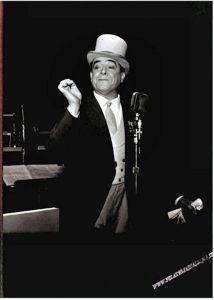 During his long career he had the opportunity to work alongside the most important partners of the time, including Isa Barzizza, his young fellow citizen from Sanremo; Carlo Campanini, Walter Chiari, Dario Fo, Cosetta Greco, Sophia Loren, Lauretta Masiero, Piero Mazzarella, Sandra Mondaini, Amedeo Nazzari, Ave Ninchi, Silvana Pampanini, Nilla Pizzi, Franca Rame, Renato Rascel, Mario Riva, Delia Scala, Tino Scotti, Nino Taranto, Ugo Tognazzi, Totò, Bice Valori, Raimondo Vianello, Alberto Sordi. Carlo Dapporto's career in cinema was also intense and full of successes, especially in the fifties, when Carlo was at the height of his success. In the cinema Dapporto starred in 38 films from 1943 to 1987, 34 of which as protagonist, co-star or in extraordinary participation, that is, as the main attraction of the film.
During his long career he had the opportunity to work alongside the most important partners of the time, including Isa Barzizza, his young fellow citizen from Sanremo; Carlo Campanini, Walter Chiari, Dario Fo, Cosetta Greco, Sophia Loren, Lauretta Masiero, Piero Mazzarella, Sandra Mondaini, Amedeo Nazzari, Ave Ninchi, Silvana Pampanini, Nilla Pizzi, Franca Rame, Renato Rascel, Mario Riva, Delia Scala, Tino Scotti, Nino Taranto, Ugo Tognazzi, Totò, Bice Valori, Raimondo Vianello, Alberto Sordi. Carlo Dapporto's career in cinema was also intense and full of successes, especially in the fifties, when Carlo was at the height of his success. In the cinema Dapporto starred in 38 films from 1943 to 1987, 34 of which as protagonist, co-star or in extraordinary participation, that is, as the main attraction of the film.
So it is an absolutely respectable film career, comforted also by an excellent success with the public, who after having elected him their favourite in the theatre, appreciate him very much also on the big screen. In the light cinema of the fifties and sixties, Dapporto was one of the great protagonists, among his most important titles we remember, "La presidenteessa"(1952) by Pietro Germi, which is perhaps one of his most prestigious films, and sees him in the role of the French minister who loses his head for Silvana Pampanini; "La signora è servita"(1945), by Nino Giannini, which was based on his idea and is his first starring film; "Il vedovo allegro"(1949) by Mario Mattoli, a sentimental comedy in which Dapporto gives the best of himself; "Ci trovi in galleria"(1953) by Mauro Bolognini, in which Dapporto is once again perfect in describing with nostalgia and emotion the lives of the poor guitti, who travel around Italy in search of writing and glory.
Other noteworthy titles are "Giove in doppiopetto" (a cinematic reduction of a text by Plautus, with a Dapporto da applause), "Finalmente libero", "Scandali al mare", "Undici uomini e un pallone" and "L'adorabile Giulio". They are all films in which Dapporto is the protagonist or co-star, and which are successful thanks also to his presence always appreciated by the audience, which has never abandoned him and has always decreed him a great affection and a great love. Finally, also worth mentioning are two sorties of the great Dapporto, in the so called "committed" cinema, with "Fortunella" (1957), directed by the great Eduardo De Filippo and with "La famiglia" (1987) by Ettore Scola, where alongside Vittorio Gassman and his son Massimo, he shows an applause interpretation, perhaps the most suffered interpretation of his extraordinary career. It is the film that marks his full maturity as an actor, confirmed by the victory of the prestigious "silver ribbon" for Best Supporting Actor, won for his masterful performance in this film. It is an award, in practice, not only for the splendid interpretation offered in the film, but it has almost the value of a lifetime achievement award, almost a silver ribbon for his career, both cinema and theatre or television. It is an award that definitively fixes Dapporto among the greats, not only of our show, but of our cinema, more specifically. Just think that the film was nominated for an Oscar as best foreign film and almost won the "Palme d'Or" at the Cannes Film Festival. It was therefore the cinema itself that offered Dapporto the opportunity to demonstrate its acting skills in a more complete way, and to allow it to test them for future generations.
Carlo's frenetic career, without ever a flop or a misstep, his extraordinary humanity and his extraordinary ability as an actor sensitive and attentive to the new generations are today the object of a careful and scrupulous revaluation, for an actor who deserves to be remembered and loved over the centuries. He also made frequent appearances on television screens, where he took part, among other things, in various carousels, as one of his most characteristic characters (Agostino), in the memorable sketches of Durban's Pasta del Capitano. Many of his programmes also aired on Rai channels, such as Il Rotocarlo with Miranda Martino, Monsieur Landrù, Crazy Boat, interventions in the Studio Uno and Senza rete varieties, and television adaptations of his plays such as L'adorabile Giulio.
Three years after his last great performance in Scola's film, he died in his house in Rome on 1 October 1989.
Acknowledgements :
In 1987 he was awarded the "Nastro d'argento" for Best Supporting Actor for his role in Scola's The Family (1987).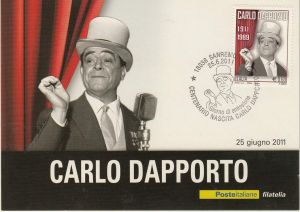 In June 2011, on the occasion of the centenary of his birth, the Italian Post Office commemorated Dapporto with a commemorative stamp in which he is depicted in a typical expression: in the background of the image stands a scarlet curtain, symbol of that theatre in which the actor has been a protagonist for years.
In June 2011, on the occasion of the centenary of his birth, the Italian Post Office commemorated Dapporto with a commemorative stamp in which he is depicted in a typical expression: in the background of the image stands a scarlet curtain, symbol of that theatre in which the actor has been a protagonist for years.
In 1957 Carlo Dapporto wins the prestigious "Maschera d'argento" (the equivalent of the "Nastro d'argento" in the cinema) for his enormous successes in the musical comedy, in the so-called "trilogia del maliardo" directed by Garinei & Giovannini: "Giove in doppiopetto"(1955), "L'adorabile Giulio"(1956) and "Carlo non farlo"(1957).
For his artistic merits he was decorated with numerous honours, including those of "Commendatore all'Ordine della Corona d'Italia" and "Commendatore all'Ordine della Repubblica italiana", while in 1965 he was awarded the title of "Meritorious Citizen" with the following motivation: « Genius actor, supported by natural inspiration and fervent and playful communication, he brought the name of Sanremo before the applauding audiences of Italy ».
He was also honorary president of the "Compagnia Stabile Città di Sanremo" since its foundation.
The square at the end of the Lungomare Italo Calvino, a theatre school and a cycling grand prix rehearsal, which attracts over a thousand participants to the Riviera on the anniversary of his death, has been named in his honour.
(taken from Wikipedia )




